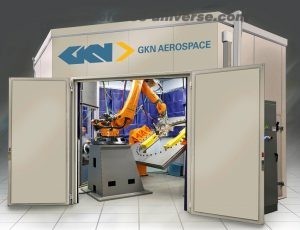
Paris. 17 June 2019. GKN announced the commissioning of a second additive manufacturing cell (Cell 2) at the U.S. Department of Energy’s (DOE) Oak Ridge National Laboratory (ORNL). Located at the DOE’s Manufacturing Demonstration Facility at ORNL, Cell 2 is the world’s largest pilot production cell of its kind and is the next stage in GKN Aerospace’s additive manufacturing research and development targeting large scale structural aircraft components.
Mike McCann, CEO of GKN Aerospace’s Aerostructures North America business said, “We are proud to introduce the next step in our additive manufacturing research as we continue to push the boundaries of this transformative technology. We believe this to be the largest laser metal deposition with wire (LMD-w) pilot production cell in the world. With this, we will target large scale aerostructure components with a focus on dramatic improvements in buy-to-fly and cost reductions over plate and forgings.”
GKN Aerospace has been at the forefront of LMD-w technology for more than a decade. This began at its world-leading aero-engine systems business based in Sweden and, in 2017, GKN Aerospace expanded its LMD-w expertise into large-scale aerostructures components by signing a five-year $17.8 million USD research agreement with ORNL.
“We are extremely proud to strengthen our relationship with this world-renowned laboratory to accelerate our progress towards fully industrializing these processes for large-scale aerostructures components. Through our cooperative research, we have seen first-hand how additive manufacturing will continue to revolutionize the design and manufacture of aircraft structures. This cell will allow us to create complex components without compromising performance,” said McCann.
“Our research collaboration with GKN Aerospace demonstrates the rapid progress that can be made when industry and the national labs work hand in hand,” said Moe Khaleel, associate laboratory director for Energy and Environmental Sciences at ORNL. “We are pleased to see our relationship with GKN expand, and look forward to continued technological innovation in our mission to translate science into solutions for advanced manufacturing.”
The 2017 agreement included the opening of GKN Aerospace’s first prototype cell at ORNL which, over the past two years, has transitioned technology from GKN Aerospace engines to aerostructures applications and implemented advanced closed-looped controls to manage the process with complex geometry. Cell 2 helps accelerate this work in the US.
The GKN Aerospace Cell 2 features include:
· 20KW laser
· 8-axis of motion
· Large area inert enviroment
· 52in x 32in max substrate size
· Two-sided deposition
Cell 2 is a pilot production cell designed to enable full industrialization of the LMD-w process for aerostructures components. Some applications will include: product development, low-rate initial production and the transition of technology development into production solutions.
GKN Aerospace already has additive manufacturing components flying on seven different major platforms today, across the commercial, military, rotorcraft, business jets and space markets.





























































































































